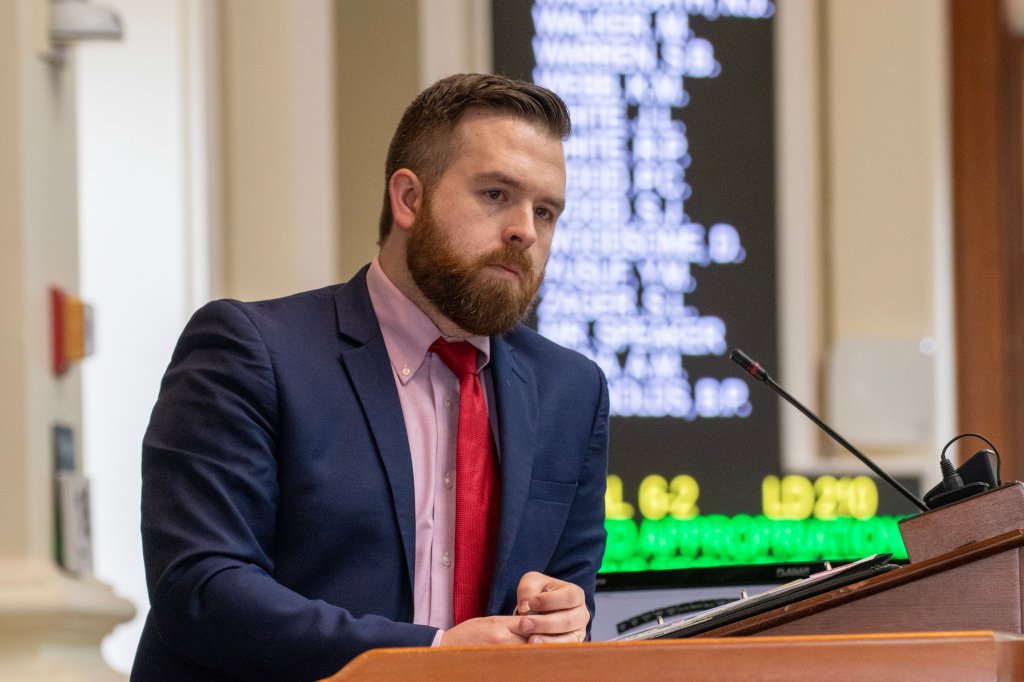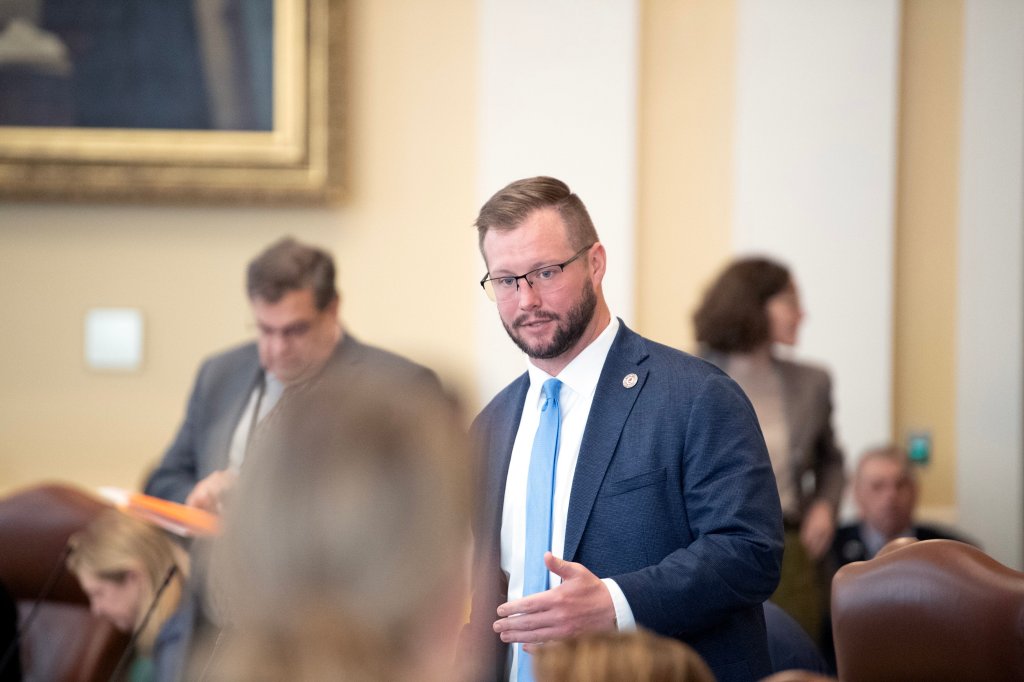Maine lawmakers have submitted more than 250 emergency bills for the upcoming session, many of which respond to President Donald Trump’s aggressive second-term agenda, including his administration’s health care cuts and crackdown on immigration.
Proposals to regulate artificial intelligence and provide property tax relief are also top of mind for lawmakers, according to a list of bill titles released late last week.
House Speaker Ryan Fecteau, D-Biddeford, said Democratic lawmakers are focused on protecting Maine families from Trump’s One Big Beautiful Bill, which made permanent his 2017 tax breaks that primarily benefited the wealthiest Americans, and cut $1 trillion from Medicaid.
On top of those cuts, the federal government is currently shut down over Democratic demands to extend health subsidies under the Affordable Care Act, which are set to expire at the end of the year. If that happens, premiums could double and millions could no longer afford coverage.

“What might be the worst part of this is that these are policies that impact families that are already struggling and who are already facing difficult decisions about what they can and what they can’t afford,” Fecteau said. “These cuts were made in order to find some of the biggest tax breaks to the wealthiest people and corporations in the world … It reeks of greed.”
It’s unclear how many of the 262 bill requests will be taken up when lawmakers return in January.
The second session is reserved for unfinished business from the previous session, budget adjustments and emergencies, although the definition of emergency legislation is loose.
The new bill requests are on top of more than 200 bills carried over from the previous session, plus more than 150 bills that have been approved by lawmakers but await funding.
Each new bill still needs to be approved by the Legislative Council, which is made up of Democratic and Republican leaders in the House and Senate. Since Democrats control both chambers, they will have a bigger say over which bills make the cut.
Some lawmakers may have trouble justifying their bills as emergencies, including bills to designate the potato as the state vegetable, update the definition of a novelty lighter and establish June 12 as “Margaretta Day,” after the the British schooner involved in the first naval battle of the American Revolution off the coast of Machias.
RESPONDING TO TRUMP
Although details of each bill aren’t yet available, the bill titles submitted by lawmakers for the second session show an appetite to respond to President Trump and congressional Republicans.
Most bills seeking to replace lost federal funding or health care benefits will likely cost the state money at a time when COVID-era relief funds have dried up and economic uncertainty brought by tariffs, inflation and the government shutdown is destabilizing state revenue.
The Legislature’s budget committee is expected to convene for an Oct. 17 briefing on the effects of Trump’s tax and health care cuts contained in the One Big Beautiful Bill.
“Looking at what’s come up the pike from D.C., it’s like they’ve blown a huge financial hole in the side of our ship,” Senate President Mattie Daughtry, D-Brunswick, said. “We really have to get our hands around our capacity to mitigate the harm to Mainers.”
Republicans have consistently called for less spending and lower taxes — and they are poised to carry that message into the next session, which will set the stage for a contentious 2026 election cycle for governor and all 186 legislative seats.
Senate Minority Leader Trey Stewart, R-Presque Isle, did not respond to questions about the second session bill requests but said lawmakers should focus on adopting the tax provisions in Trump’s mega bill, which the Mills administration said last week would cost more than $400 million.
“Tax conformity is the most important thing we can do, which the Democrats will block because they want to keep spending money that doesn’t belong to them instead of reducing the tax burden on Maine people,” Stewart said in a text message.

IMMIGRATION, VACCINES, FOOD ASSISTANCE
Immigration enforcement continues to be a top priority for the Trump administration. Masked federal agents have been detaining people off the streets, including a father who was taken after dropping his child off at a Portland school.
And Trump has sent the National Guard to cities with Democratic leaders, including Portland, Oregon and Chicago, to address crime and conduct immigration sweeps.
Maine lawmakers have proposed at least five bills in response to the federal immigration crackdown.
Rep. Grayson Lookner, D-Portland, has proposed bills prohibiting law enforcement officers from wearing masks to conceal their identity and to prevent the National Guard from “participating in campaigns of mass expulsion.”
Rep. Eleanor Sato, D-Gorham, wants to increase constitutional protections against unreasonable search and seizure in public schools and health facilities, while Sen. Jill Duson, D-Portland, wants to create a right to an emergency review for people who are erroneously detained.
Protecting vaccines also generated several proposals. U.S. Health Secretary Robert F. Kennedy, Jr. has added vaccine skeptics to his advisory panel and no longer recommends COVID vaccines for most people, or combined measles, mumps, rubella and chickenpox vaccines for children under the age of 4.
Rep. Amy Arata, R-New Gloucester, is pursuing a bill to allow pharmacists to order and administer vaccines. Rep. Sally Cluchey, D-Bowdoinham, appears to have a similar bill, though her’s would require insurance coverage. Two other bills, including one from Daughtry, would address vaccine access as well.
Food assistance is on Democrats’ radar, too. Fecteau is sponsoring a bill to prevent federal cuts to food assistance for families and seniors, while other bills would ensure access and enhance the Supplemental Nutrition Assistance Program, the federal program sometimes known as food stamps that is administered by states.
OTHER PRIORITIES
At least eight bills have been submitted to address high property taxes — an issue under review by a special task force that’s expected to issue an interim report by January and final report by the end of next year.
Proposals include increasing the homestead exemption, which helps primary residents, and limiting property tax levies for large towns.
Stewart has a vague bill title to “provide property tax relief for seniors,” but it’s not clear what it would do. Three years ago, he was the architect of a program that allowed seniors to freeze their property taxes. But that program was repealed after it proved to be unsustainable in terms of costs and administrative burdens for municipalities.
Nine bills have been submitted to regulate artificial intelligence. Several of those are aimed at adopting task force recommendations, while others would specifically address election security, mental health services, deceptive audio and video of people, and child pornography.
Other bills would require school districts to adopt policies protecting free speech rights of educators — an issue that emerged when people lost jobs over social media posts following the killing of conservative activist Charlie Kirk.


We invite you to add your comments. We encourage a thoughtful exchange of ideas and information on this website. By joining the conversation, you are agreeing to our commenting policy and terms of use. More information is found on our FAQs. You can modify your screen name here.
Comments are managed by our staff during regular business hours Monday through Friday as well as limited hours on Saturday and Sunday. Comments held for moderation outside of those hours may take longer to approve.
Join the Conversation
Please sign into your CentralMaine.com account to participate in conversations below. If you do not have an account, you can register or subscribe. Questions? Please see our FAQs.